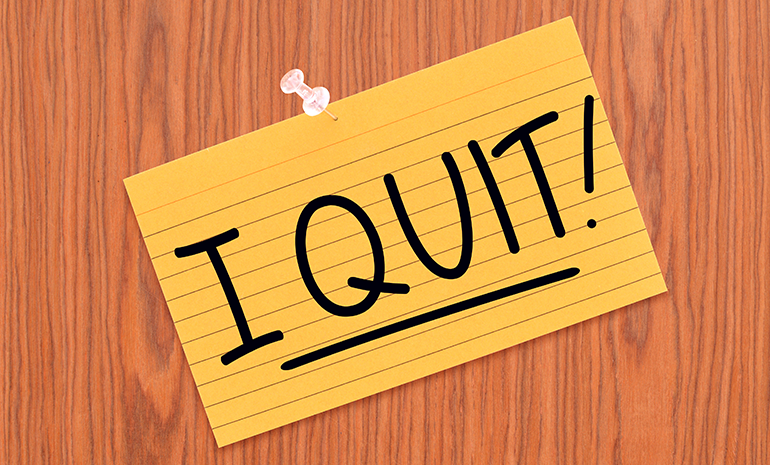Resigning from a company is a big step in any individual's life and if not done well, it could lead to missed opportunities in the future. As per the Bureau of Labor Statistics, an average human will have 12 jobs in their lifetime. So it’s very likely that you too will go through this process. It’s better to be prepared beforehand, rather than collecting important points just before handing in the papers. So, here’s a 101 to help you smooth out the resignation process.

Why Is It Important to Do This Process Properly?
Data from LinkedIn in 2021 showed that almost 5% of all new hires in that year were ex-employees who joined the company again. And since then, this trend has been on the rise.
Now imagine, you want to rejoin your previous company, but would they hire you if you end your relationship on a bad note? Even though you might be great at your job?
Having good relations with past employers builds your credibility and reputation. Apart from that, there may come a time in the future when you need references at your new workplace.
Things to Keep in Mind Before Beginning the Process of Quitting
First, check your contract, which you must’ve signed when joining. It’ll have conditions for your quitting and details about the notice period. Apart from that, before finalizing your decision to quit the job, it’s recommended that you have a word with your employer. If there’s scope for changing your mind, they’ll try to do it. They may offer you alternatives, something like a pay raise or an upgrade in the role. And, if it’s related to any workplace conflict, they’ll try to resolve that. Of course, they can’t force you to stay at the company.
Taking A Break?
Sometimes you’d resign just because you require a breather and a break from everything to focus on yourself. And, if you’re doing so, then be honest about it while putting your papers down. Explain your reasons and rationales for deciding, while being completely professional about it.
While you are taking some time off, you’ll need money to sail through this period. Keep yourself prepared so that no financial storm can throw you away. Stay connected with your colleagues so that when you feel confident and prepared enough to reenter the workforce, you can use their references and sources to get in. Utilize this time off to upskill, try out new things, and reflect on your career.
Resigning 101
1. Have a Job Offer Ready
If you’re quitting a job to get a better role at another organization, it’s safe to have the job letter ready. Finalize the joining date with the company, and ask them for an offer letter beforehand. Once the letter is received, put down your papers at the current company. It’ll smoothen your transition from one job to another without clashing with your joining or ending date.
2. Inform Your Manager
More than a formality, informing your manager about your decision is a professional courtesy. Have a proper discussion with them and state the reasons behind your decision. It might come to them as a surprise, so choose an appropriate time and only then inform them. While being firm in stating your decision, be kind enough to also let them process it and say what they have in their mind. They’ve played a role in shaping your life at the company, so it’s only natural for them to feel the way they want to. Apart from the sentimental reasons, doing so will help your manager get a head-start to look for your replacement and sort out the process of transition.

3. Follow the Resignation Protocol
There are set protocols for every exiting employee, and they are mentioned in the joining letter. Most companies have a month to three months as the duration of the notice period, but cross-check it once with HR, if there are any changes in the rules. Also, ask them about the policy the company has for unused paid time-offs. A few companies do have policies to reimburse exiting employees for not using these time-offs. Confirm if you can retain any health insurance benefits for some time after your resignation.
You can get prorated bonuses even after resigning based on the number of days served in the bonus year. And if you’re nearing retirement and have worked in the same company for more than 5 years, you can get a gratuity. It’s a lump sum payment calculated based on the last drawn salary and the number of years worked. Apart from this, there may also be some unpaid dues from your side, so do get it clarified with your HR.
4. Help in the Transition Process
If you’re vacating a space in the team, it’s mostly your responsibility to train the replacement adequately. Once the replacement has been assigned, teach them your tricks, and show them how you conducted the business and how they should go about it. Consider using HRMS software, like greytHR, to show the progress of the replacement to your managers and for other coordination processes as well. With real-time data and analytics, managers can then decide whether the training methods are effective or not.
5. Have an Exit Interview
It’s a common practice across companies to have exit interviews conducted by HR or the manager. Treat this as you treated your first interview here, and prepare a few pointers accordingly. Be prepared with some feedback for the company, and also to get some feedback in return about your work performance. Try to keep the entire session positive and healthy, and avoid any demeaning comments.

6. Ask for References and Important Documents
One of the things that we’ve been reiterating again and again is that the resignation process should end on good terms for both parties. It helps you get good references in the future if at all the need arises. You can bring this up during your exit interview. Start with the learnings you had during your time at the company and how you appreciate everything that the company has done for you. Then, go on to talk about how you require a reference letter for your new job. This will be a good addition to your CV.
Apart from that, also ask for documents that may come in handy at the new workplace like the experience letter, relieving letter, etc. Don’t forget to collect documents such as payslips, Form 16, and IT statements. Follow up with your HR to obtain these or if your company uses an HRMS, like greytHR, this process becomes even simpler. greytHR has an Alumni portal where all of these documents remain accessible to you even after you have resigned from the organization.
7. Return Company Items
Every item provided by the company, be it laptops, mobiles, vehicles, company documents, or ID cards, should be returned on the last day of work. Delete all the personal data that you might have stored on it. Clean out your desk in the end and keep it ready for the next person to use.
8. Submit a Proper Resignation Letter
One of the most important steps while resigning from a company is handing in a formal resignation letter. This could be done via mail too.
Here’s how you can write a resignation letter:
Subject Line: [Start by expressing gratitude] Thank you for this opportunity
Hey [Manager’s/Boss’s/HR’s name],
[Show gratefulness up-top] As you know, I’ve decided to move on from this company, but I can’t thank you enough for the opportunity that you’ve given me.
[Learning at the company] The things I have learned here will help me in the future. I would also like to thank my teammates, my manager, and others who’ve been supportive of me throughout my journey.
[Optimism about the company’s future] I’m sure the company is only going upwards from here on, and I have full trust in the management team to make that happen.
[Update about formalities] Furthermore, I’ve ensured that all the formalities are completed and the transitioning process won’t be chaotic.
[Offer assistance] Hope that our paths cross again in the future in any capacity whatsoever!
Thank you again for everything.
Sincerely,
[Your Name]
9. Let your Work Buddies Know
A lot of you might say, “Why is this important?” It is! You spend the most time of your week with these people, naturally, a bond is formed between you guys. And, if you’re staying away from home for your work, these people literally become your family. So doesn’t it make sense to let this family know about your decision?
Summing Up
Now you know how you end your relationship with a company, formally and professionally. If you’re taking a break, just say it. If not, then tell them that you’re looking to transition to some other role. And, it’s wise to have a job letter ready before resigning. Informing your manager and colleagues should be a priority, as they need to figure out many things and process them as well.
You have to ensure that the transition process is smooth and doesn’t cause any issues for the team or the company.
FAQs
What Is the Best Way to Resign from a Company?
The best way to resign from a company is by giving a valid reason for quitting. While on that, be prepared for any questions that might be asked for your decision. It’s wise to do this while in person rather than by mail. Serve your notice period and train the one who’s chosen to replace you. At last, let your colleagues know about the choice you’ve made.
What Is the Best Thing to Say When Resigning?
It depends on what to say while resigning if you’re doing it because of the issues you’re having with work, don’t get into nitty gritties. You can always say it’s because of personal reasons, or just be straight-up honest about it. If you’re quitting to get better opportunities, mention that.
How Do I Tell My Boss I'm Resigning?
Start by holding a special meeting between you two and begin by thanking them for the opportunity. Then slowly give your reasons for taking the call. Once you’ve given them enough context, you can say that you’ve decided to put down your papers.
Meta description: Learn the professional way to resign from your job with a formal resignation letter, completing the notice period, and ending terms on a positive note.








